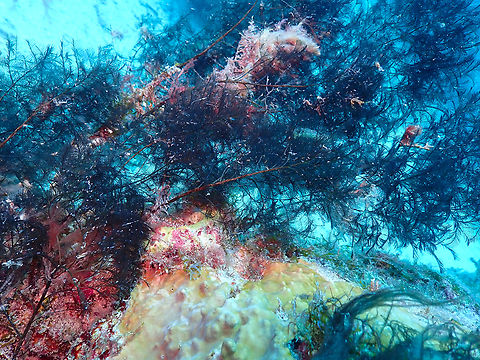
Appearance
N. clarkei grows in large, teeming colonies, of black color. The stems (20 to 30 cm high, or even more) are firmly anchored to the substrate thanks to a network of branched tubes (hydrorhizae*) similar to plant roots. The stem and branches are thick, formed by the apposition of numerous tubes (the colony is called polysiphonic*), thus giving a certain rigidity to the colony. The ends of stems and branches can be bent. The main stem gives rise to lateral branches arranged in the same plane, in an alternating more or less irregular manner. The branches can divide further in turn to give secondary branches, more rarely tertiary. The stem and branches give rise, alternately on either side, to fine branches (the hydroclades*), arranged like the barbules of a feather. Each hydroclade is composed of a succession of small segments, each carrying a compartment (hydrotheque*) into which the feeding polyps or hydranths* can retract. These hydrotheques are cup-shaped, the edge of which is made up of 9 rounded teeth.Naming
Synonym: Macrorhynchia clarkeiDistribution
This species is found in the Western Atlantic, throughout the Caribbean basin, up to the Bahamas.In the Eastern Atlantic, it is reported in Cape Verde.
Habitat
It grows on rock or coral reef, from 15 to 360 m.It prefers areas exposed to current.
Reproduction
Fertile colonies are recognizable by the formation, at branch level, of basket-shaped structures called pseudo-corbulae, by analogy with the typical corbulae present in the genus Aglaophenia. These formations result from the specific modification of certain groups of hydroclades. The pseudo-corbulae curve around the gonothecae and thus protect the gametes. The means of gamete dispersal has not been studied in this species, which is still very little known.Food
Feeds on plankton.References:
Some text fragments are auto parsed from Wikipedia.
https://www.marinespecies.org/aphia.php?p=taxdetails&id=117808https://doris.ffessm.fr/Especes/Macrorhynchia-clarkei-Hydraire-buisson-noir-2629
https://reefguide.org/keys/stingingbushhydroid.html